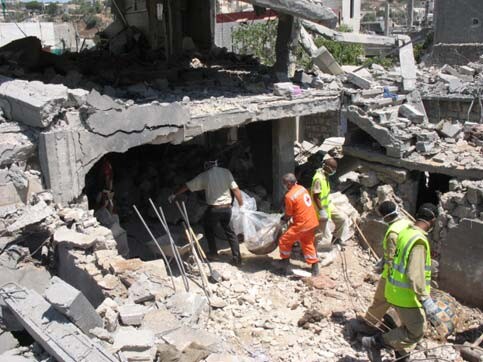IRIN 17 August 2006

Red Cross workers found 16 bodies under the rubble in Ainata, four of which were children under 10. (IRINNews/Marie Claire Feghali)
Behind a destroyed school, Nabil Chrara sat on a pile of rocks, crying his heart out as he watched a tractor dig up the bodies of four members of his family. “They refused to leave the house,” he said.
The village of Bint Jbeil, some 80 km south of Beirut, bore witness to some of the heaviest fighting between Israel and Hezbollah. “They have been dead for 25 days now,” said Nabil Chrara. “My neighbour survived, but not my family.”
Behind him, Yusef Abdalla Harb looked across from the tent he has erected over his ruined home to Maroun Al-Ras, a hilltop still occupied by Israeli troops.
“Do you see their tank?” he asked. “This house was all my life,” he added. “I had to work abroad for 20 years before I gained enough money to build it. So I’m not leaving before they do.”
In Bint Jbeil, just 10 km north of the Lebanese-Israeli border, barely a single house remains intact. As another resident, Hajja Umm Ali, stepped over debris and shattered glass, she said she had packed what remains of her house into two black plastic bags.
Umm Ali was grieving for her seven cows and donkey. “I lost everything, I had put all my life in those cows, they fed me, and [they] starved to death,” she told IRIN. “My whole provision of grains and wheat and flour burned with the rest of the house. What will I do now?”
For the best part of a month, the road from Beirut to Bint Jbeil was pounded by Israeli air raids. At Bazouriyeh, 65 km south of Beirut, only portraits of the Hezbollah leader, Sayyed Hassan Nasrallah, could be seen, yellow against the grey streets and houses.
Bazouriyeh, where Nasrallah was born, was a ghost town. All towns beyond the southern city of Tyre have been without water, electricity, food supplies and telephone connections for about a month.
As an Israeli travel ban was still in force south of the Litani River, relatively few displaced people, coming to check up on their belongings, continued right through to villages as close to the Israeli border as Bint Jbeil and Ainata.
The road from Ainata to Bint Jbeil smelt strongly of decaying bodies, prompting Lebanese Red Cross rescue workers and other humanitarians from the Gulf state of Qatar to wear several masks on top of each other.
A Red Cross spokesman in Ainata, Daniel Jerjes, told IRIN the rescue team arrived to Ainata on Tuesday, and were able to dig out eight bodies. “Today, we found another 10, four of children aged from two to 10 years, and two are elderly.” None of them was recognisable, he said, so they needed to be identified by neighbours.
The only cedar tree Ainata had was burned, so were most of the houses and mosques. Cedar trees are the national symbol of Lebanon.
“They are punishing us because we support Sayyed Hasan [Nasrallah],” said Umm Fuad Juni, sitting on the pile of debris that used to his house. “But we will not hate him, God bless him. It’s all the Arab countries and the world I hate now. Their silence was even louder than the bombs, and for that, I will never forgive them. Never.”
This item comes to you via IRIN, a UN humanitarian news and information service, but may not necessarily reflect the views of the United Nations or its agencies. All IRIN material may be reposted or reprinted free-of-charge; refer to the copyright page for conditions of use. IRIN is a project of the UN Office for the Coordination of Humanitarian Affairs.
Related Links